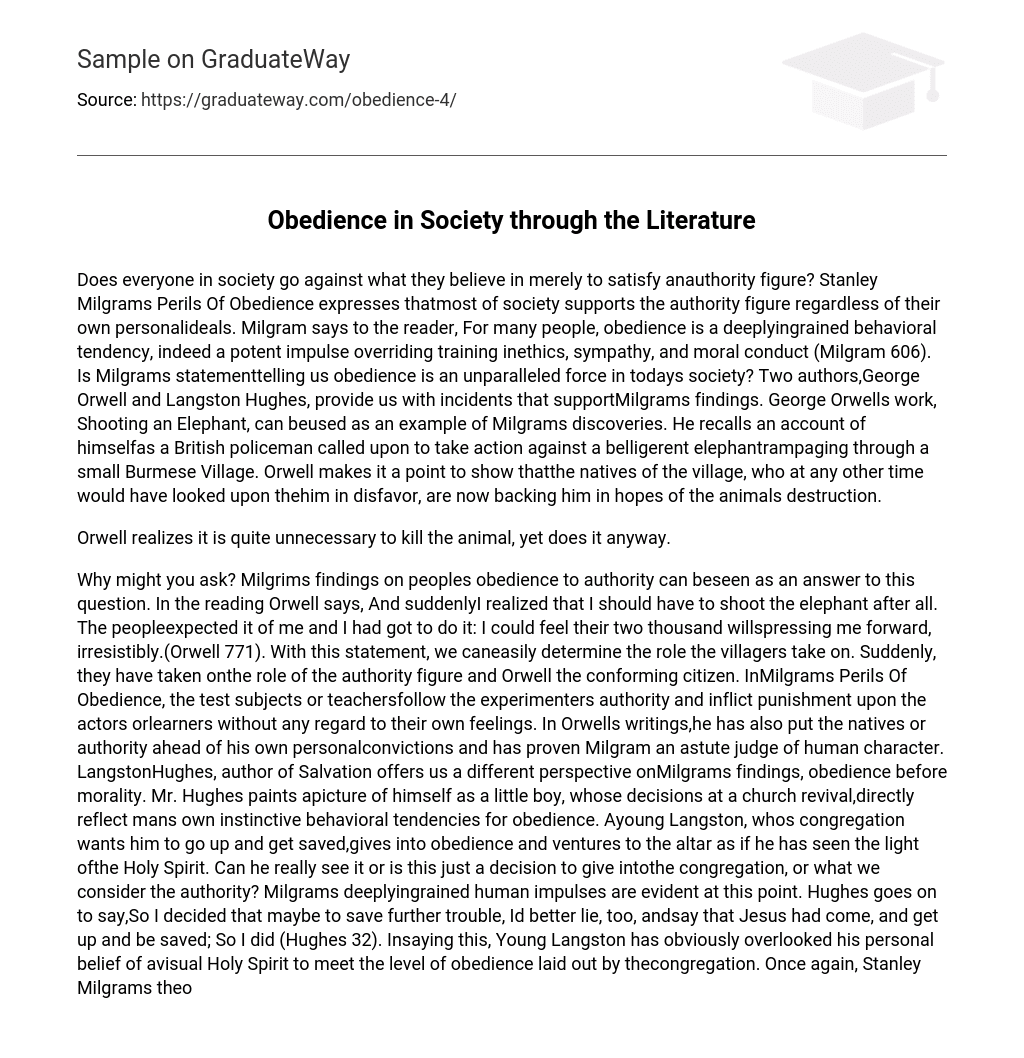Does everyone in society go against what they believe in merely to satisfy anauthority figure? Stanley Milgrams Perils Of Obedience expresses thatmost of society supports the authority figure regardless of their own personalideals. Milgram says to the reader, For many people, obedience is a deeplyingrained behavioral tendency, indeed a potent impulse overriding training inethics, sympathy, and moral conduct (Milgram 606).
Is Milgrams statementtelling us obedience is an unparalleled force in todays society? Two authors,George Orwell and Langston Hughes, provide us with incidents that supportMilgrams findings. George Orwells work, Shooting an Elephant, can beused as an example of Milgrams discoveries. He recalls an account of himselfas a British policeman called upon to take action against a belligerent elephantrampaging through a small Burmese Village. Orwell makes it a point to show thatthe natives of the village, who at any other time would have looked upon thehim in disfavor, are now backing him in hopes of the animals destruction. Orwell realizes it is quite unnecessary to kill the animal, yet does it anyway.
Why might you ask? Milgrims findings on peoples obedience to authority can beseen as an answer to this question. In the reading Orwell says, And suddenlyI realized that I should have to shoot the elephant after all. The peopleexpected it of me and I had got to do it: I could feel their two thousand willspressing me forward, irresistibly.(Orwell 771).
With this statement, we caneasily determine the role the villagers take on. Suddenly, they have taken onthe role of the authority figure and Orwell the conforming citizen. InMilgrams Perils Of Obedience, the test subjects or teachersfollow the experimenters authority and inflict punishment upon the actors orlearners without any regard to their own feelings.
In Orwells writings,he has also put the natives or authority ahead of his own personalconvictions and has proven Milgram an astute judge of human character. LangstonHughes, author of Salvation offers us a different perspective onMilgrams findings, obedience before morality. Mr. Hughes paints apicture of himself as a little boy, whose decisions at a church revival,directly reflect mans own instinctive behavioral tendencies for obedience.
Ayoung Langston, whos congregation wants him to go up and get saved,gives into obedience and ventures to the altar as if he has seen the light ofthe Holy Spirit. Can he really see it or is this just a decision to give intothe congregation, or what we consider the authority? Milgrams deeplyingrained human impulses are evident at this point. Hughes goes on to say,So I decided that maybe to save further trouble, Id better lie, too, andsay that Jesus had come, and get up and be saved; So I did (Hughes 32).
Insaying this, Young Langston has obviously overlooked his personal belief of avisual Holy Spirit to meet the level of obedience laid out by thecongregation. Once again, Stanley Milgrams theories are correct. Hisdiscoveries bind us to the fact that people may believe strongly in an idea orthought but, will overlook that belief to be obedient. In conclusion, what doesthis leave the reader to think? Do people conform to authority? Is societyholding back its views inorder to meet a level of obedience?
Stanley Milgram haspointed out a human characteristic that may very well be in each and every oneof us. George Orwell and Langston Hughes have both given us two examples thatsupport and defend this theory. With all this evidence compounded, we thereader can make a justified assumption that everyone in society has, at onetime or another, overlooked his or her personal feelings to conform. Thisoccurrence, whether it is instinctive or judgmental is one that each individualdeals with a personal level.





